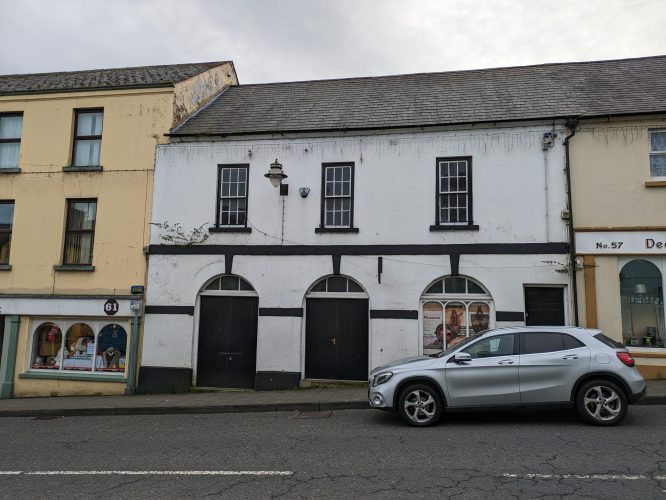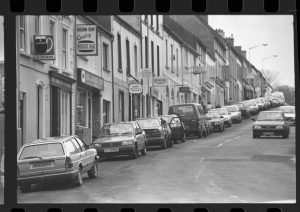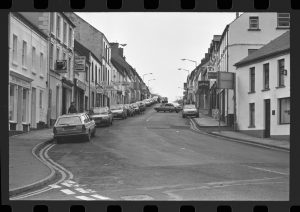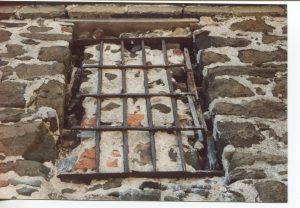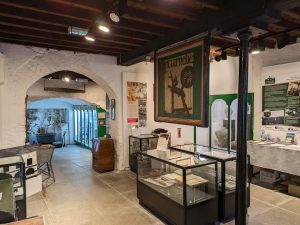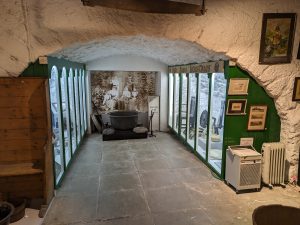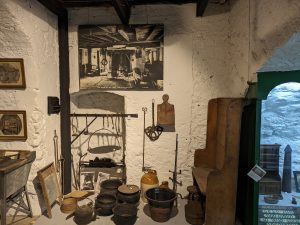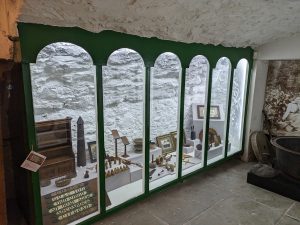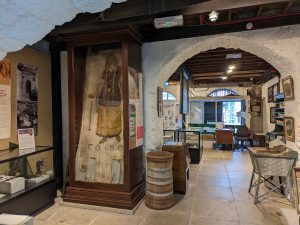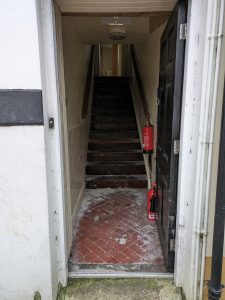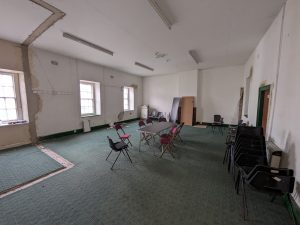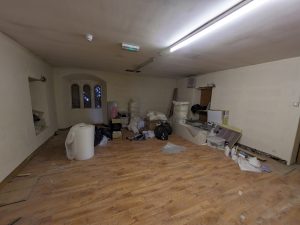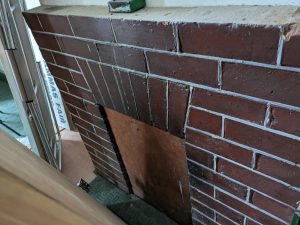59 Castle Street, Ballycastle

A History of Castle Street, Ballycastle
25th November 2024
Limavady & District War Memorial Roll of Honour
2nd December 202459 Castle Street, Ballycastle
Address: 59 Castle Street
Listing: B2 (Built Heritage at Risk NI Ref: 05/15/002)
Construction date: 1740-1759 (Historic Buildings Record HB05/15/016), 1736 (PRONI D2977/3A/2/29/1)
|
Year |
Owner/leasee | Business name |
Building use |
Notes |
| 1736 | Hugh Boyd | Courthouse | Manor court |
A lease of 1736 from Hugh Boyd to the Earl of Antrim states “a house in the village of Ballycastle wherein the said courts have lately been held, which was lately built for that purpose … situate on the south side of the said village of Ballycastle.” (PRONI D2977/3A/2/29/1; see also Montgomery in The Glynns vol.28 (2000)). JMcC research states that the building stands on “Margie More” the original market location at the intersection of the road from Dunineny Castle (now Clare Street and Moyle Road) and Main Street (now Castle Street), see also McGill in The Glynns vol.34 (2006). |
| 1811 |
JMcC research states that there is a stone, to the rear of the property, with the inscription “Andrew Reevey 1811” (not visible in 2023-2024). |
|||
| 1831 | Market house/ shambles, manor courts and gaol |
OSM IX vol.24, pp.89, 98 (p.89) “The market house stands in one of the principal streets and near the centre of the town. It is a plain 2-story building. The lower part is viewed as a sort of shambles or market place and the room above as a place for holding manor courts and petty sessions. “The gaol or bridewell is in the rear of the market house and consists of 2 cells or rooms underground and 2 above. It is merely used for confining riotous persons in, but was formerly used in connection with the manor court for the purpose of confining debtors decreed in it.” (p.98) “2 magistrates reside in the town of Ballycastle and 1 about a mile from it … There are no stipendiary magistrates. There is no place where the laws or magistrates are more respected, or where there is more domestic peace or security. There are 6 constabulary and 4 coastguards in Ballycastle. “A manor court is held in Ballycastle on the first Wednesday in the month for the recovery of debts under 10 pounds, and a court leet is held once in 6 months. Petty sessions are held in Ballycastle on every second Tuesday. At least 2 magistrates always attend. “No outrages of any kind have been committed even within a remote period. No combinations exist, nor is there any smuggling. There is a little illicit distillation carried on in Glenshesk, but since the establishment of the revenue it has greatly decreased…” |
||
| 1835 | Market house and gaol |
Historic Buildings Record HB05/15/016. |
||
| 1853 | Market house |
Receiver’s Report for the Ballycastle Estate of 1853 states “That there is a weekly market held in said town of Ballycastle for the sale of grain and other farm produce, at which a considerable quantity of grain is sold, but there is great want of a accommodation for same; the house known as the market house in Ballycastle and which is the property of the Earl of Antrim, being of small dimensions and not suitable for general market for farm produce, is not used for the sale of grain, but principally for the sale of Butcher’s meat. That in consequence of the want of accommodation in said market house, grain, butter in firkins, and other articles of like nature have to be exhibited for sale on the open street, and the only accommodation for weighing same is provided by some of the tenants of the estate who have erected cranes in front of their premises….and charge for use of same”. |
||
| 1859 | Courthouse and Andrew Sharpe | Courthouse and grocers |
Historic Buildings Record HB05/15/016. Andrew Sharpe is listed as a grocer in Slater’s 1856 Directory. |
|
| 1864-1871 | Courthouse and Andrew Sharpe |
SMcM research based on Griffith’s Valuation registers. |
||
| 1872-1878 | Courthouse and William Sharpe |
SMcM research based on Griffith’s Valuation registers. |
||
| 1879-1901 | Courthouse and (William?) Sharpe and Daniel McKinley |
SMcM research based on Griffith’s Valuation registers. |
||
| 1901 | Courthouse and (William?) Sharpe and Daniel McKinley | Courthouse and hardware store |
Census – building no. 10 No occupants |
|
| 1902-1905 | Courthouse and (William?) Sharpe and Daniel McKinley |
SMcM research based on Griffith’s Valuation registers. |
||
| 1906-1908 | Courthouse and Daniel McKinley |
SMcM research based on Griffith’s Valuation registers. |
||
| 1909-1911 | Courthouse |
SMcM research based on Griffith’s Valuation registers. |
||
| 1911 | Courthouse |
Census – building no. 10 No occupants |
||
| 1912-1929 | Courthouse |
SMcM research based on Griffith’s Valuation registers. |
||
| 1921 | McAlister’s | Hardware store | ||
| 1929 | Ballycastle Urban District Council | Courthouse and stores |
Historic Buildings Record HB05/15/016. |
|
| 1930 | Ballycastle Urban District Council | Courthouse |
SMcM research based on Griffith’s Valuation registers. Historic Buildings Record HB05/15/016. |
|
| 1931 | Ballycastle Urban District Council | Petty sessions court |
Ballymoney Free Press and Northern Counties Advertiser 05/03/1931 notes a complaint regarding the petty sessions court as being cold, with no fire, and an inability to close the windows. |
|
| 1941 | Ballycastle Urban District Council | Petty sessions court |
Larne Times 26/07/1941 states “Mr. J.P McCann, Ballymena said Ballycastle courthouse was one of the coldest places he knew and the only fire was in the magistrate’s room. They might as well be in a field (laughter).” |
|
| 1940s | Ballycastle Urban District Council | Fire brigade store |
According to Danny Morgan and Peter Molloy (oral history 14/05/24), the council kept the fire brigade (a cart pushed by two men with a hose and a ladder) in the side passageway. Supposition that the civil defence/home guard also operated out of the building during WWII. |
|
| 1940s – 1950s | Dispensary |
Dispensary for ration books as well as orange juice, cod liver oil, dried milk/formula for children (Working Group review 19/12/24). |
||
| 1960s-1980s | Ballycastle Urban District Council
As a result of the 1972 Local Government Act (Northern Ireland), Ballycastle Urban and Rural District Councils merge to form Moyle District Council on 12st October 1973. |
Various uses upstairs, stores downstairs |
The Credit Union was relocated to here from Market Street before moving to Ann Street. According to Harriet Hamilton (12/11/24), the Credit Union operated out of the upstairs of the building during the 1960s. She worked there as a teenager in the evenings. In September 1970, a bomb was put through the letterbox of the courthouse. The detonator had gone off but failed to ignite five pounds of gelignite. The device was discovered by Credit Union staff the following day (Belfast Telegraph 04/09/1970, p.3). Court sessions still heard upstairs until November 1987 when it the court temporarily moved to Ballymoney; a move that became permanent in August 1988. However, throughout this time, the building also saw other uses (Built Heritage at Risk NI BHARNI Ref: 05/15/002, Historic Buildings Record HB05/15/016). Library located in the rear room upstairs from 1950s until it moved to no. 41 Castle Street in the 1970s or 1980s (Working Group review 19/12/24). JMcC research notes that Jean Fogarty, was the librarian (daughter of Ted Fogarty the Town Clerk). According to Danny Morgan (oral history 14/05/24), downstairs housed a private museum exhibition in the 1970s. The collection belonged to Jimmy Gunn (originally from Draperstown). This appears to have been a single year as the following year the exhibition was housed at ‘Scarlett’s’, no.41 Castle Street. According to Roger Perritt, Peter Molloy and Danny Morgan (oral history 14/05/24), the Marconi radio club used the courtroom as their meeting space and premises for a number of years from 1980s(?) into the mid-2010s. |
|
| 1987 | Moyle District Council | Irish World and Ballycastle Museum | Museum |
According to Danny Morgan and Peter Molloy (oral history 14/05/24), Gary Hastings, Supervisor of Irish World in Coleraine thought that the building would make a good museum. He spoke to the council in 1986, and they agreed that Irish World could have an office and establish a museum downstairs. Museum opened in June 1987. The museum was then staffed by Irish World for a number of years before they moved to Clare Street. After that time, it was staffed by council seasonal employees for the months of July and August. |
| 2004 | Moyle District Council | Ballycastle Museum | Museum |
According to Peter Molloy (oral history 14/05/24), while working as seasonal museum staff in 2004, he set up a Friends of Ballycastle Museum Facebook page and for a while responded to queries, mostly about genealogy. Stopped responding to queries in 2004 or 2005. |
| 2011 | Moyle District Council | Ballycastle Museum | Museum |
According to Melanie Brown and Roger Perritt (oral history 14/05/24), Melanie approached the council to establish Friends of Ballycastle Museum as a community group, voluntarily extending the opening of Ballycastle Museum beyond July and August. The group first met in 2011/2012 and then Melanie went to New Zealand for a year; no activities took place that year and the group went into abeyance. |
| 2014 | Moyle District Council | Ballycastle Museum | Museum |
According to Melanie Brown and Roger Perritt (oral history 14/05/24), the Friends Memorandum of Understanding was drawn up with the council to enable the Friends to operate within the museum from Easter-end of September, Fridays, Saturdays, Sundays. |
| 2015 | Causeway Coast and Glens Borough Council | Ballycastle Museum | Museum |
Moyle District Council merges with Ballymoney, Coleraine and Limavady to form Causeway Coast and Glens. |
| 2023 | Causeway Coast and Glens Borough Council | Ballycastle Museum | Museum |
Work begins on Development Phase of project to restore and refurbish the museum with support of The National Lottery Heritage Fund. |
- November 1991, Chronicle and Constitution Archive
- November 1991, Chronicle and Constitution Archive
- 2005, courtesy Danny Morgan
- November 2023
- November 2023
- November 2023
- November 2023
- November 2023
- November 2023
- November 2023
- November 2023
- November 2023


